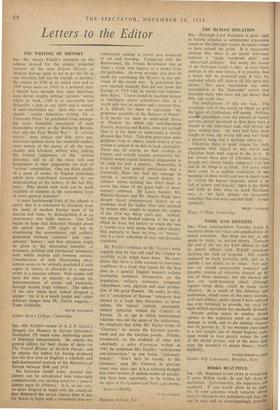Letters to the Editor
THE WRITING OF HISTORY SIR,—Mr. Henry Fairlic's strictures on the scheme devised for the sixteen projected volumes of the new Oxford History, of Modern Europe seem to me to go too far in one direction, but not far enough in another. He objects to 1789 as an initial date and to 1939 (even more to 1945) as a terminal date. I should have thought that, since historians must devise roughly defined.' periods' within which to work, 1789 is as reasonable and defensible a date as any other and is already in well-established use. And why on earth should ' serious historians writing for a University Press' be precluded from attempt- ing some historical assessment of such momentous events as the Bolshevik Revolu- tion and the First World War ? If serious history' must always end fifty years ago, informed opinion about the twentieth century must remain at the mercy of all the more shoddy and frivolous writers who, lacking the trained judgement of the ' serious historian,' will be all the more rash and tendentious in their judgements for lack of ' serious' competition. One can think readily of a score of works, by English historians, which have contributed immensely to our understanding of the history of the last fifty years. Why should such work not be made available to students in the convenient form of more general histories ?
A more fundamental fault of the scheme is surely that it is calculated to eliminate from the study of modern Europe most of its interest and value, by disintegrating it in an unnecessary and futile manner. One had begun to hope that historical thought about the period since 1789 might at last be abandoning the conventional and artificial
distinction between national ' and ' inter- national' history: and that attention might be given to the interesting interplay of economic, political and intellectual tendencies both within nations and •between nations. Consideration of such illuminating inter- actions seems to be virtually precluded if each aspect of history is allocated to a separate writer in a separate volume. Few readers will have the time or tenacity to pursue the interconnections of events and tendencies through sixteen large volumes. The editors of the new series have indeed dropped a clanger: but it is a much louder and rather different danger than Mr. Fairlie suggests.— Yours faithfully,
DAVID TIIOMSON
Sidney Sussex College, Cambridge










































 Previous page
Previous page